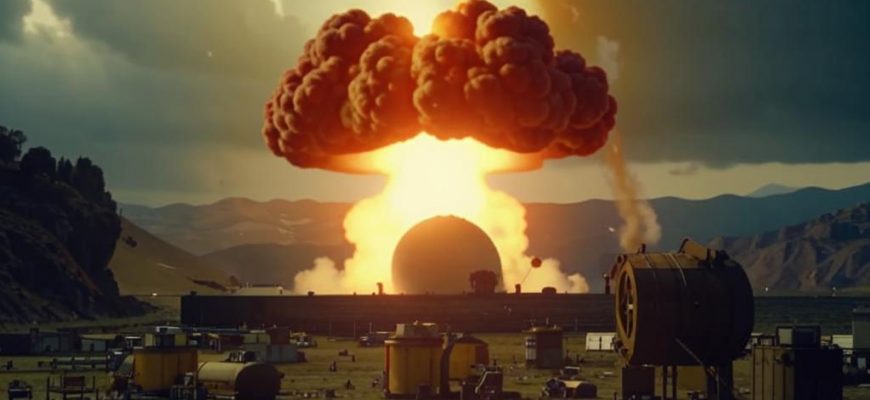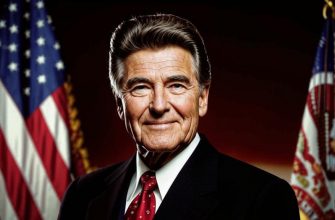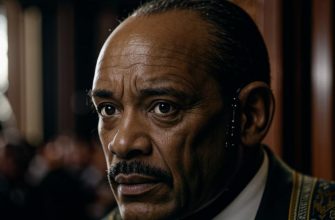The development of the nuclear bomb represents one of the most significant and controversial milestones in human history, forever altering the dynamics of global power and introducing the concept of mutually assured destruction (MAD) to international relations. Unsurprisingly, this epoch has been a rich vein for filmmakers, providing a canvas to explore themes of moral ambiguity, the burden of scientific discovery, espionage, and the human cost of technological advancements. Films about developing the nuclear bomb often delve into the tension-filled race for nuclear capability during World War II, the ethical dilemmas faced by scientists, and the global espionage battles that ensued during the Cold War. Below are films that encapsulate these themes, offering both historical and dramatized accounts of the era when humankind harnessed the power of the atom.
“Fat Man and Little Boy”, 1989
Director: Roland Joffé

Directed by Roland Joffé, this film tells the story of the Manhattan Project, the secret U.S. endeavor during World War II to develop the first nuclear weapons. It focuses on the personal and ethical conflicts faced by lead scientist J. Robert Oppenheimer (played by Dwight Schultz) and the military officer in charge, General Leslie Groves (played by Paul Newman).
Starring: Paul Newman, Dwight Schultz, Bonnie Bedelia, John Cusack, Laura Dern, Ron Frazier, John C. McGinley, Natasha Richardson, Ron Vawter, Michael Brockman;
Production year: 1989;
Genre: biography, drama, history;
MPAA rating: pg13;
Duration: 127 min.;
Rating: IMDB: 6,5;
More information about the film “Fat Man and Little Boy” on the website imdb.com
“The Manhattan Project”, 1986
Director: Marshall Brickman

A unique take on the theme, this film directed by Marshall Brickman isn’t about the historical Manhattan Project but rather a clever, suspenseful tale of a high school student who builds a nuclear bomb for a science fair, highlighting the dangerous proliferation of nuclear technology.
Starring: John Lithgow, Richard Council, Robert Schenkkan, Paul Austin, Adrian Sparks, Curt Dempster, Bran Ferren, Christopher Collet, Jill Eikenberry, Cynthia Nixon;
Production year: 1986;
Genre: science fiction, thriller;
MPAA rating: pg13;
Duration: 117 min.;
Rating: IMDB: 6,1;
More information about the film “The Manhattan Project” on the website imdb.com
“Copenhagen”, 2014
Director: Mark Raso

Based on Michael Frayn's play of the same name, this film (often presented as a televised play) explores a historical meeting that occurred in 1941 between physicists Niels Bohr and Werner Heisenberg. The latter was a key figure in Nazi Germany's own nuclear weapon development efforts. The film delves deep into their complex relationship and the ethical considerations of atomic research during wartime.
Starring: Gethin Anthony, Frederikke Dahl Hansen, Sebastian Armesto, Olivia Grant, Baard Owe, Mille Dinesen, Martin Hestbæk, Tamzin Merchant, Preben Ravn, Sebastian Bull;
Production year: 2014;
Genre: drama, melodrama, adventure;
Duration: 98 min.;
Rating: IMDB: 7;
More information about the film “Copenhagen” on the website imdb.com
“The Beginning or the End”, 1947
Director: Norman Taurog

One of the earliest films to tackle the subject, this dramatized account tells the story of the Manhattan Project, from its inception to the bombings of Hiroshima and Nagasaki. Though it takes some liberties with historical accuracy, it reflects the contemporary perspective on atomic energy and the morality of its use in war.
Starring: Brian Donlevy, Robert Walker, Tom Drake, Beverly Tyler, Audrey Totter, Hume Cronyn, Hurd Hatfield, Joseph Calleia, Godfrey Tearle, Victor Francen;
Production year: 1947;
Genre: drama, war, biography, history;
Duration: 112 min.;
Rating: IMDB: 6,6;
More information about the film “The Beginning or the End” on the website imdb.com
These films, while varying in style, scope, and historical fidelity, all contribute to the broader conversation about the profound impact of nuclear weapons, blending factual representation with narrative storytelling to examine the ramifications of this world-changing technology.
In conclusion, films about the development of the nuclear bomb delve deep into one of the most transformative and morally complex periods in human history. Through varying lenses of drama, suspense, ethical questioning, and historical documentation, these narratives unravel the intricate tapestry of ambition, fear, genius, and the daunting shadow of unintended consequences. They not only serve as a stark reminder of the monumental moment when humanity harnessed the power of the atom but also invite viewers to reflect on the ongoing implications of nuclear proliferation and the delicate balance of peace. By portraying the scientists, politicians, and ordinary individuals caught in the whirlwind of this groundbreaking endeavor, these films encourage a profound contemplation about the essence of power, the price of progress, and the indelible impact of scientific discovery on the course of human events.









